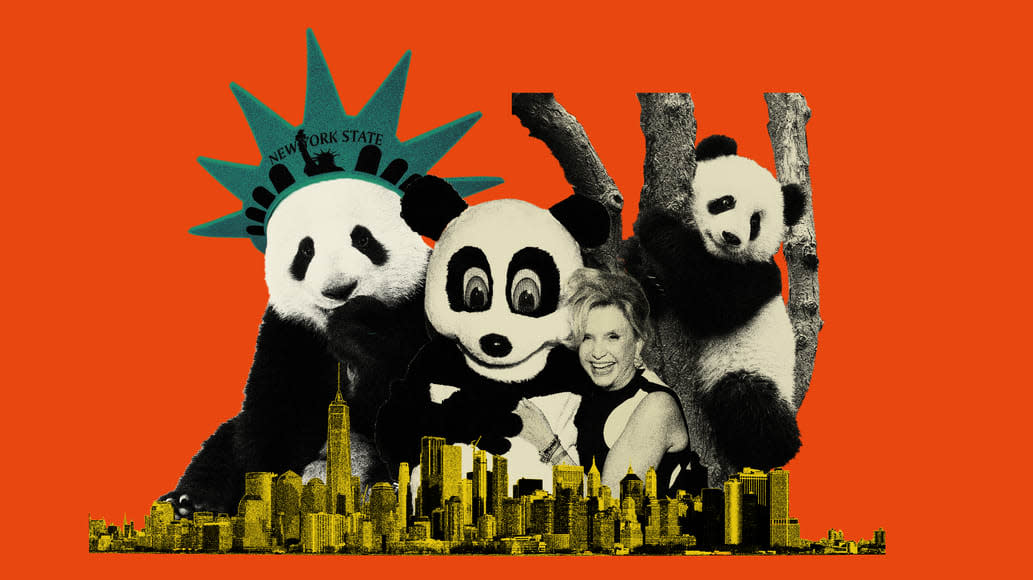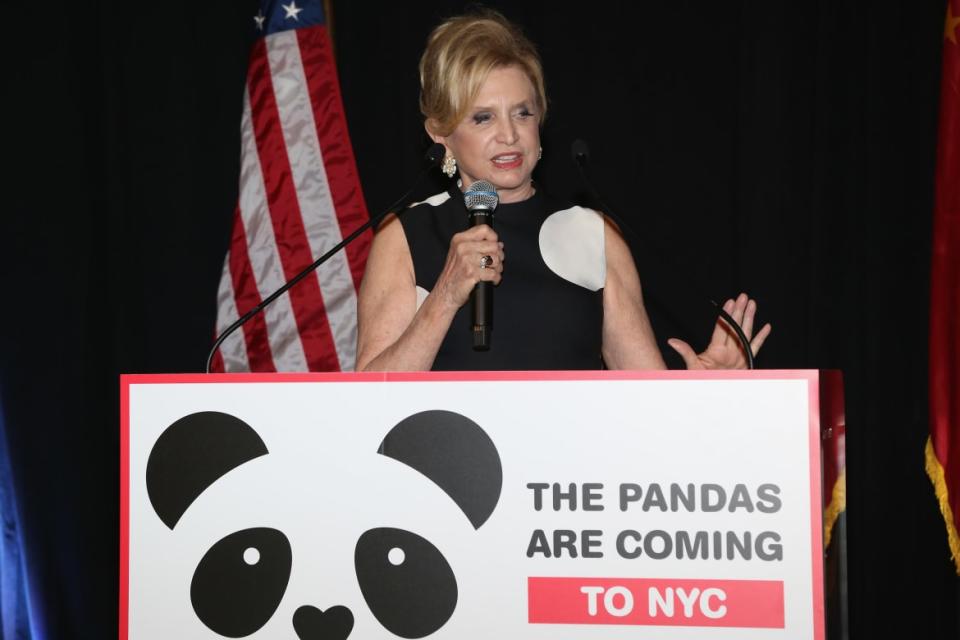Inside a U.S. Rep’s ‘Deeply Troubling’ Brush With China’s Panda Diplomacy

A New York City congresswoman’s years-long quest to bring giant pandas to Central Park Zoo may have inadvertently exposed a soft white underbelly to the Chinese government, which has long used the iconic animals as instruments of its international agenda.
Rep. Carolyn Maloney’s fixation on bringing the bamboo-chomping beasts to the Big Apple has become an inside joke among local politicos—so much so that an opponent once taunted her at a press conference with a man dressed in a panda suit.
City Hall and local zoos have balked at the cost of caring for the animals, which could top $50 million, but the congresswoman has pursued her dream nonetheless: traveling to the creatures’ native country, courting diplomats, helping launch a nonprofit to raise the necessary funds, and even hosting a glitzy Manhattan bash that reportedly amassed half a million dollars toward the cause.
This campaign entailed extensive contact and cooperation with individuals and institutions financially linked to Beijing, The Daily Beast has found. In a statement to The Daily Beast, Maloney’s team lambasted the idea these entanglements had left her “somehow compromised.”
“She has no apologies for her ardent championing of this endeavor, and hopes that when the geopolitical climate is right, New Yorkers will welcome a panda,” a spokesperson said in a statement to The Daily Beast.

Rep. Carolyn Maloney hugs a human panda at the first Annual Black & White Panda Ball in 2017.
The spokesperson noted Maloney was among 48 co-sponsors to a 2019 bill calling for Hong Kong’s continued autonomy from mainland China, and 115 sponsors of a 2021 measure barring the import of apparel likely made in the forced labor camps into which the regime has herded members of its Uighur minority.
But an examination of the Democrat’s activities, and consultation with experts on Chinese foreign policy, indicate that Maloney’s ursine obsession may have left her prey to an exotic subspecies of international intrigue—panda diplomacy.
“Panda diplomacy is part of Chinese soft power policy,” Dr. Chee Meng Tan of the University of Nottingham wrote to The Daily Beast, referring to an approach of projecting influence abroad through means other than force. “Having pandas has the potential of improving New Yorkers’ perception of China, and this is what panda diplomacy, as a seeming token of friendship, is supposed to do.”
For decades, China has used its control over the entire population of the rare mammal as a tactic to advance its interests abroad: softening its authoritarian image, forging business relations, and even gaining leverage over foreign governments. In recent years China has used its power to repatriate the bears to penalize both the United States and Austria for holding high-level meetings with the Dalai Lama.
“Getting pandas may mean that the host has Beijing’s seal of approval. This implies two things: (i) Pandas may be a culmination of increasing cooperation between China and some locality (e.g. in terms of trade and investment) (ii) It may be a harbinger of future cooperation,” wrote Tan. “But this beckons the question of what the cost (political or otherwise) may be when governments and officials engage in panda diplomacy.”
Sources told The Daily Beast that Maloney’s fascination with pandas dates back at least a decade. But her efforts appear to have reached an inflection point in 2014 when she journeyed to the Chengdu panda breeding center—a trip her disclosures show was funded by the Chinese People’s Institute for Foreign Affairs. The Institute is a quasi-governmental entity founded by the late Premier Zhou Enlai and which, according to its charter documents, operates under the auspices of the ruling Communist Party with the aim of “making friends for the country.” Its leader today is Wang Chao, the country’s vice minister of foreign affairs.

Rep. Carolyn Maloney attends First Annual Black & White Panda Ball at The Waldorf-Astoria Starlight Roof on Feb. 8, 2017, in New York City.
Maloney’s camp declined to answer questions about how plans for this sponsored excursion came about.
According to a 2015 article in the South China Morning Post, during her junket Maloney met with Li Xiaolin of the Chinese People’s Association for Friendship with Foreign Countries. The congresswoman confirmed this report in a later radio appearance.
Numerous national security reports have described this organization as an arm of the Chinese Communist Party’s ‘United Front’ system, which seeks to advance the country’s geopolitical interests by forging relations with local political and economic elites. In 2020, the State Department formally identified the People’s Association for Friendship as a foreign mission, and accused it of having “sought to directly and malignly influence state and local leaders.”
It was to Xiaolin that Maloney made her formal request that China lend New York City two of its pandas.
After returning to the United States, Maloney began attending events at the Chinese consulate in New York and embassy in D.C., including at a 2016 “Panda Night,” where Ambassador Cui Tiankai declared the animal an emissary between the U.S. and his own nation. That same year, The New York Times noted Maloney had scored a fundraising “coup” for her panda plan by securing the support of the billionaire Maurice “Hank” Greenberg, the former AIG CEO who has become one of the country’s most prominent boosters of trade and diplomatic relations with the Middle Kingdom.
In 2018, Xi Jinping personally bestowed a “friendship” medal on Greenberg in recognition of his decades-long business partnership with the state-controlled People’s Insurance Co. of China, as well as his work for multiple municipal governments and financial institutions in China. Greenberg did not respond to repeated requests for comment.
“He loves China, and he’s done a lot of business in China since World War II,” said fellow billionaire John Catsimatidis, a longtime personal friend and supporter of Maloney’s. “And he feels the way I feel about bringing New York and China closer together.”

Maurice Greenberg, Rep. Carolyn Maloney, and John Catsimatidis attend First Annual Black & White Panda Ball at The Waldorf-Astoria Starlight Roof in 2017.
The two tycoons together formed a nonprofit, The Pandas Are Coming to NYC, in 2016 with the aim of making Maloney’s dream a reality. Joining them was cosmetics and media mogul Yue Sai-Kan, whom People magazine has called “the most famous woman in China,” and who, according to her website, is the only living American to appear on a Chinese government postage stamp. The group’s mission: to amass the tens of millions of dollars necessary to construct and maintain a panda pavilion in Central Park.
To achieve this goal, Maloney and the new organization hosted Manhattan’s glitterati and a number of congressional colleagues at a panda-themed ball at the Waldorf-Astoria Hotel in early 2017. New York Magazine reported that the state-controlled China Construction America and China Merchants Bank were among the event's sponsors, while at the head table sat Chinese consul Zhang Qiyue.
At the time, the gala was widely reported to have raised roughly half-a-million dollars. However, the organization’s tax filings that year showed revenues of just over $127,000.

A female giant panda cub named Sheng Yi at the National Zoo in Kuala Lumpur.
Catsimatidis, who said the group now has about $150,000 in the bank, chalked the discrepancy up to the high cost of using space at the Waldorf-Astoria.
“You give an event at the Waldorf-Astoria, if it raised $300,000, it probably cost $150,000 to put on,” he said.
As it happens, the legendary venue at the time belonged to the Chinese insurance firm Anbang, since liquidated by Beijing regulators following an embezzlement scandal. The company’s 2014 purchase of the famed hotel reportedly led the State Department to break its tradition of allowing the president to stay there while visiting New York. Catsimatidis dismissed the idea that the ownership had any bearing on the panda party’s setting, insisting the group selected the location based solely on its luxury reputation.
Just months afterward, Maloney cut the ribbon at a Hainan Airlines event announcing direct flights to New York from Chongquing and Chengdu, home of the Panda Center. Hainan Airlines is majority owned by the Hainan provincial government. She also began to receive campaign gifts from Kan—whose donations to the congresswoman’s committees now total $23,000.
Maloney has also become a promoter and attendee of the “Made in China” fashion shows put on by the Kan-led China Beauty Charity Fund—which, according to its website, is a wing of the Soong Ching Ling Foundation, a Chinese government-controlled charity. Kan shared a photo of herself with Maloney at a fundraiser last fall.
https://www.facebook.com/yuesaikanofficial/photos/a.2319992808026909/6914730545219756/
A representative for Kan told The Daily Beast the businesswoman was traveling and unavailable to comment for this story.
Meanwhile, according to Catsimatidis, the panda project remains on hold pending conversations with New York City Mayor Eric Adams.
Of course, Maloney’s lobbying efforts for the pandas—and her promotion of the “Made in China” fashion show—are all within the bounds of the law. But for Dr. Han Yin Li, associate professor at Tokyo International University’s Institute for International Strategy, it appears a textbook case of the Chinese government’s efforts to court foreign publics.
“The pattern is exactly how public diplomacy works. In recent years, China has attempted to promote its soft power and national image overseas, while the means are mixed with non-governmental, semi-official or track II channels with the coordination of the Chinese embassies overseas,” said Li (track II channels refer to efforts to establish a rapport with select individuals, rather than through traditional government channels). “And definitely the Chinese public diplomacy targets individuals and particular persons with political influence in the targeted countries through exchanges, sponsorship and recognition.”
Other scholars The Daily Beast consulted expressed surprise at the extent of Maloney’s engagements and exertions.
“I haven’t heard of any other instances whereby a current American congressman/woman has asked for giant pandas from China, or has been as involved,” said Marcus Tan, who recently finished a masters’ thesis on panda diplomacy at Columbia University. “I know of a few examples where zoological associations/research institutes have been involved in discussing the giant pandas, but not a political actor as in this case.”
“Someone from America asking for pandas is a great PR exercise for China because it shows how the U.S.A. wants to partake in Chinese culture/soft power, through the giant panda,” he added.
Julian Ku, a law professor at Hofstra University and longtime China watcher, noted that all of Maloney’s activities fell well within the bounds of House ethics rules. Nonetheless, he described them as “unseemly” and “highly troubling,” given the Asian autocracy’s increasingly harsh treatment of dissenters and minorities at home and of U.S. allies.
“It does illustrate how members of Congress can find themselves intertwined with sophisticated Chinese Communist Party political influence efforts that often use cultural or educational activities to build relationships with U.S. political elites,” Ku wrote to The Daily Beast. “Increasingly, China should be seen as more similar to Russia or Saudi Arabia than Korea or Japan, and Congress members like Maloney need to be aware of this.”
But Catsimatidis argued that tightening ties between Asia’s Sleeping Giant and the City That Never Sleeps is the entire point of the panda project.
“We have two choices: make war or make peace. What would you like?” Catsimatidis argued. “There’s something to be said with our crisis going on with China right now, to try to defuse the crisis by making a peaceful gesture and bringing pandas to New York City.”
Get the Daily Beast's biggest scoops and scandals delivered right to your inbox. Sign up now.
Stay informed and gain unlimited access to the Daily Beast's unmatched reporting. Subscribe now.

 Yahoo Movies
Yahoo Movies 
